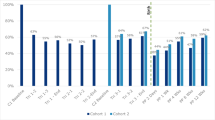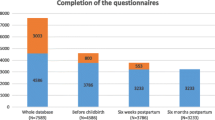Abstract
The purpose of this study is to estimate characteristics predictive of postpartum mood change symptoms among urban women. Women receiving prenatal care at The Mount Sinai Hospital OB/GYN Diagnostic and Treatment Center and who delivered over one calendar year (2007; n = 884) were evaluated for psychosocial risk factors at their first prenatal visit and then subsequently for postpartum mood symptomatology (n = 510) at 6 weeks postpartum. Symptoms associated with postpartum depression (PPD) were best predicted by a pre-pregnancy history of physical or sexual abuse, a history of psychiatric problems, or psychiatric diagnosis at the time of first prenatal visit. This study provides the first large sample evidence that PPD is associated with the report of sexual or physical abuse. Screening for a history of abuse, a history of psychiatric problems, or having a psychiatric illness at the time of the first prenatal visit may be an efficient means to identify women at risk for developing PPD. Early identification of women at risk would provide an opportunity to provide a selective prevention intervention to reduce the likelihood of PPD symptomatology.
Similar content being viewed by others
References
Abou-Saleh MT (1998) Hormonal aspects of postpartum depression. Psychoneuroendocrinology 23:465–475
Beck CT (1998) The effects of postpartum depression on child development: a meta-analysis. Arch Psychiatr Nurs 12(1):12–20
Beck CT (2001) Predictors of postpartum depression: an update. Nurs Res 50(5):275–285
Brand SR, Brennan PA (2009) Impact of antenatal and postpartum maternal mental illness: how are the children? Clin Obstet Gynecol 52(3):441–455
Centers for Disease Control and Prevention (2008) Prevalence of self-reported postpartum depressive symptoms—17 States, 2004–2005. MMWR 57(14):361–366
Cox J, Holden J (2005) Perinatal mental health: a guide to the Edinburgh Postnatal Depression Scale. The Royal College of Psychiatrists, London
Cox JL, Holden JM, Sagovsky R (1987) Detection of postnatal depression. Development of the 10-item Edinburgh postnatal depression scale. Br J Psychiatry 150:782–786
Hanusa BH, Scholle SH, Haskett RF, Wisner KL (2008) Screening for depression in the postpartum period: a comparison of three instruments. J Womens Health 17(4):585–596
Harris B, Huckle P, Thomas R, Johns S, Fung H (1989) The use of rating scales to identify post-natal depression. Br J Psychiatry 154:813–817
Heise L, Ellsberg M, Gottemoeller M (1999) Ending violence against women. Population Reports, Series L, No. 11. Johns Hopkins University School of Public Health, Population Information Program, Baltimore, December
Kendler K, Thornton L, Gardner C (2000) Stressful life events and previous episodes of major depression in women: an evaluation of the “kindling” hypothesis. Am J Psychiatry 157:1243–1251
Mason J, Edlow M, Lear M et al (2001) Screening for psychosocial risk in an urban prenatal clinic population: a retrospective practice-based research study. Soc Work Health Care 33(3/4):33–52
McCoy SJ, Beal JM, Saunders B, Hill EN, Payton ME, Watson GH (2008) Risk factors for postpartum depression: a retrospective investigation. J Reprod Med 53(3):166–170
Morris-Rush JK, Freda MC, Bernstein PS (2003) Screening for postpartum depression in an inner-city population. Am J Obstet Gynecol 188:1217–1219
Murray L, Carothers AD (1990) The validation of the Edinburgh Postnatal Depression Scale in a community sample. Br J Psychiatry 157:288–290
Murray L, Cooper PJ (1996) The impact of postnatal depression on child development. Int Rev Psychiatry 8:55–63
New York State Department of Health (2007) New York State Medicaid program. Policy guidelines manual for Article 28 certified clinics. Updated 1 June 2007. Available at https://www.emedny.com/ProviderManuals/Clinic/PDFS/Clinic_Policy_Guidelines.pdf. Accessed on: 19 May 2008
Oates M (2003) Suicide: the leading cause of maternal death. Br J Psychiatry 183:279–281
Pearlstein T, Howard M, Salisbury A, Zlotnick C (2009) Postpartum depression. Am J Obstet Gynecol 200(4):357–364
Pinto-Foltz MD, Logsdon MC (2008) Stigma towards mental illness: a concept analysis using postpartum depression as an example. Issues Ment Health Nurs 29(1):21–36
Ross LE, Dennis C-L (2009) The prevalence of postpartum depression among women with substance use, an abuse history, or chronic illness: a systematic review. J Women's Health 18:475–486
Segre LS, O'Hara MV, Arndt S, Stuart S (2007) The prevalence of postpartum depression. Soc Psychiatry Psychiatr Epidemiol 42(4):316–321
Weissman MM, Pilowsky DJ, Wickramaratne PJ et al (2006) Remissions in maternal depression and child psychopathology: a STAR*D-child report. JAMA 295(12):1389–1398
Author information
Authors and Affiliations
Corresponding author
Rights and permissions
About this article
Cite this article
Silverman, M.E., Loudon, H. Antenatal reports of pre-pregnancy abuse is associated with symptoms of depression in the postpartum period. Arch Womens Ment Health 13, 411–415 (2010). https://doi.org/10.1007/s00737-010-0161-7
Received:
Accepted:
Published:
Issue Date:
DOI: https://doi.org/10.1007/s00737-010-0161-7




